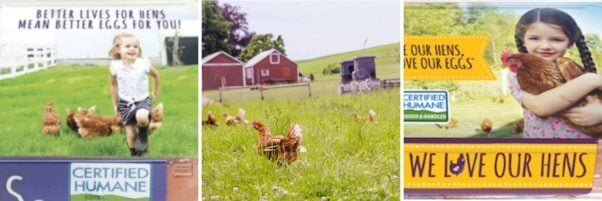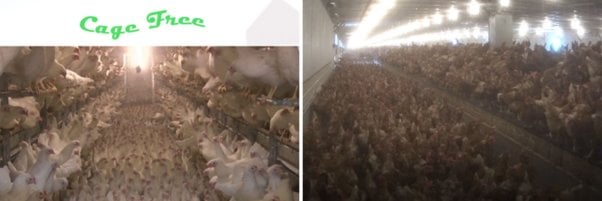Egg Industry Humane Washing Case Summaries
Case Name: Lugones, et al. v. Pete and Gerry’s Organics, LLC and Nellie’s Free Range Eggs
Index Number: 1:19-cv-02097
Court: U.S. District Court for the Southern District of New York
Case Name: Usler, et al. v. Vital Farms, Inc., et al.
Index Number: 1:21-cv-447-RP
Court: U.S. District Court for the Western District of Texas, Austin Division
When the only information consumers have about the eggs they buy comes from the companies that produce them, it’s understandable that they’d be deceived by humane washing: depictions of hens enjoying vast, lush, grassy fields and advertising assurances that “hens can peck, perch, and play on plenty of green grass” and go outside “every day” and that all “farm animals” in the supply chain are treated humanely.
But these claims are drastically different from the truth. For example, PETA eyewitness video footage of a Nellie’s Free Range Eggs supplier showed approximately 20,000 hens confined to a single extremely crowded shed with severely restricted access to the outdoors, which they could reach only by fighting their way to hatchways that were only occasionally open. This is standard. For eggs to be sold as “free range” or “pasture raised,” the third-party certifier that many major egg sellers like Nellie’s and Vital Farms (more on this company below) pay to endorse their products, Humane Farm Animal Care (HFAC), requires that each hen be allowed just 1.2 square feet of floor space, which is barely larger than their bodies. These same standards also allow undeniably cruel practices, such as the uniform maceration of male chicks; cutting or burning off day-old hens’ sensitive beaks (to prevent pecking among the stressed, severely crowded birds); over-laying, which causes hens to become painfully “spent” after they’re only a year and a half old; and selling those no-longer-profitable birds to the same industrial slaughterhouses as factory-farmed—and conventionally marketed—chickens.


Following PETA’s investigation, PETA Foundation lawyers took action to protect consumers. In March 2019, they and co-counsel filed a federal lawsuit in the Southern District of New York on behalf of consumers who were misled into buying eggs sold under the “Nellie’s Free Range Eggs” label. Three years later, in March 2022, PETA Foundation lawyers helped file a similar lawsuit against Vital Farms in federal court in the Western District of Texas. Both these lawsuits challenged the claim that hens had outdoor access and these companies’ use of industry-standard practices—including chick killing, beak cutting, and sale for slaughter.
PETA Foundation Secures Denial of Motions to Dismiss
Both Pete and Gerry’s Organics (the owner of Nellie’s Free Range Eggs) and Vital Farms filed motions to dismiss the respective lawsuits. The former primarily based its arguments on the theory that its advertising was mere “puffery” and so implausible that no consumers could be deceived. Vital Farms argued that it should get a free pass for its “humane” marketing claims due to its certification by HFAC.
In historic decisions, both egg sellers lost their arguments. In February 2020, the Southern District of New York held that a marketing campaign showing hens “frolicking in elysian pastures” could provide “enough specificity to elevate itself beyond puffery.” And in March 2022, the Western District of Texas held that Vital Farms—which had used its motion, in part, to rant about PETA’s “extremist agenda” (even though PETA wasn’t a party in the case)—“plainly, and perhaps purposefully, misse[d] the gravamen of Plaintiff’s claim.” Specifically, the Western District of Texas recognized that HFAC set “certain standards for the spacing of birds in poultry houses and only require[d] hens have ‘access’ to—but not actual use of—pastures when the temperature is greater than 32 degrees. … Under the HFAC Standards, hens that have never spent any time in a pasture can be considered ‘pasture raised.’” As the court explained, there is no basis to argue that “conformity to third-party standards, which may not represent a term’s plain meaning as understood by consumers, renders the term not misleading as a matter of law.” Otherwise, as the court recognized, this argument would mean that hens who “have never spent any time in a pasture can be considered ‘pasture raised.’” As a result of these decisions, there is now clear precedent that “free range” and “pasture raised” imply to consumers that hens have “actual use of … pastures.”
The Western District of Texas also set a landmark precedent by allowing all claims challenging the industry-standard approach to the entire chicken life cycle—from hatching and chick killing to beak cutting and slaughter—to stand.
The case against Nellie’s was resolved via a negotiated settlement following the Southern District of New York’s decision permitting the plaintiffs’ claims to move forward. Claims against Vital Farms remain pending.
Vital Farms Sanctioned for Ugly Tactics
During the course of litigation against Vital Farms, that company—apparently still focused on PETA’s “extremism”—hit on a novel method of revenge: far-reaching third-party document and deposition subpoenas against PETA and the PETA Foundation, which weren’t even parties in the lawsuit, including demands that the PETA Foundation produce its counsel’s litigation files and other privileged materials and that PETA produce essentially all of its files related to its vegan advocacy efforts—i.e., hundreds of thousands of documents and what would have amounted to a treasure trove of corporate espionage. Similar subpoenas were sent to a former PETA employee and to a noted law professor, based on the fact that the latter had conducted a podcast interview with one of the PETA Foundation lawyers.
PETA and the PETA Foundation retained outside counsel at K&L Gates and Zuckerman Spaeder and sued to block these subpoenas, filing motions to quash them in the Eastern District of Virginia. In multiple April 2023 decisions, the Eastern District of Virginia, unamused by Vital Farms’ tactic, recognized that it had offered no “legitimate explanation of why it must obtain this material from PETA” and that the demands to the PETA Foundation covering privileged documents were a “particularly ugly” strategy. The court also pointed out that “[i]n several instances, Vital did not attempt to explain relevance or need for the documents or testimony it demanded, and it never addressed obvious alternative sources.”
The Eastern District of Virginia then imposed sanctions on Vital Farms for compelling PETA and the PETA Foundation to defend themselves “against overly broad and burdensome subpoenas, for which Vital failed to establish relevance or need” and which “imposed significant undue and unnecessary expense on PETA and the Foundation.” In December 2023, Vital Farms and the subpoenaed entities agreed that it would pay $292,000 to settle claims relating to the court’s award of sanctions.
Egg Lawsuits Surge Based on the PETA Foundation’s Precedents
Because PETA Foundation lawyers’ theory of these cases has been upheld by the courts, it has now been embraced by the broader plaintiffs’ bar. In March 2022, another Southern District of New York court—in response to a lawsuit that duplicated PETA Foundation lawyers’ allegations and imagery—allowed another lawsuit challenging Nellie’s advertising to move forward based on the legal arguments and precedent established in the earlier case. Since then, additional similar lawsuits have been filed by lawyers for other plaintiffs.


